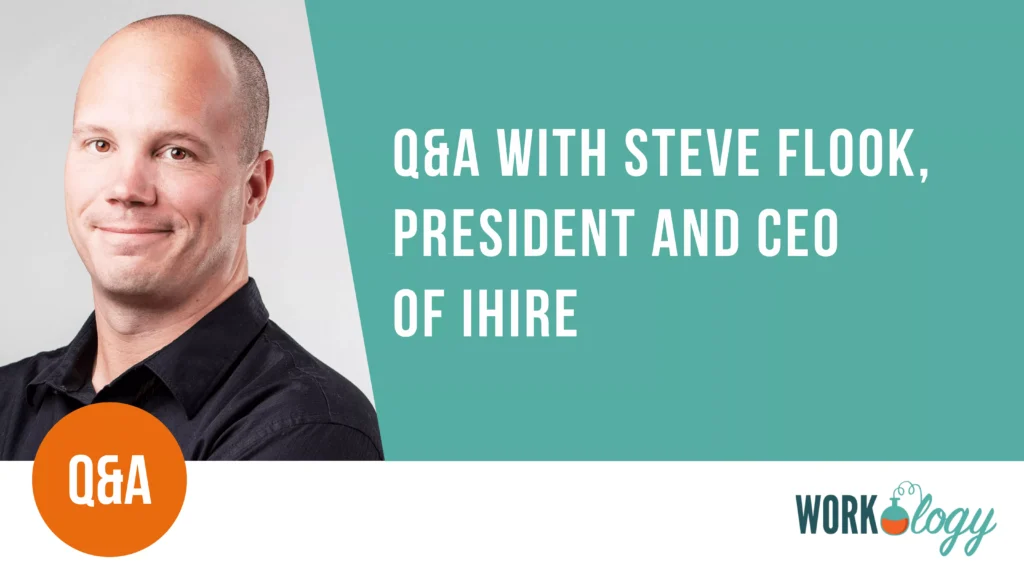This interview is part of a new series on Workology that features an HR Technology company, its founder and its features. For this post, we’re talking to Steve Flook, President and CEO of iHire.
Steve Flook is President and CEO of iHire, a career-oriented platform that brings candidates and employers together in 57 industry-focused talent communities. As a technologist focused on software systems and information architecture, Flook has been at the forefront of the HR and recruitment technology space for a decade. Prior to his role as CEO, Flook served as a change agent with many operational roles at iHire, including president, VP of product development, and director of engineering. He previously spent 11 years at 270net Technologies, serving as CTO and providing technology consulting services in both the public and private sector.
5 Questions With Steve Flook, President & CEO of iHire
Q: At its most basic level, how does iHire serve employers and job seekers?
“Our mission is to connect employers with qualified talent and job seekers with meaningful employment through 57 industry-specific talent communities. This industry-focused approach allows users to narrow their searches and find the right candidates or the right jobs faster than they would with a general job board. Today, employers of all sizes rely on our suite of flexible advertising and branding solutions to attract high-quality applicants. At the same time, candidates turn to our job search resources – including resume scoring tools, templates and builders, and team of career advisors – to find work quickly.”
Q: What are the most important trends HR leaders should be focused on right now?
“Hiring is tough at the moment due to a confluence of workplace disruptions – ongoing unemployment, continued remote work, and interest across the workforce in changing careers. These trends are not only making it more difficult to hire but also to retain current employees. As a result, employers are left with gaps to fill and few suitable applicants to fill them – our State of Online Recruiting survey showed that 73.9% of employers struggle to find qualified candidates. HR leaders should focus on getting the right talent in the door when the opportunity arises, and keeping their current staff satisfied in their jobs, even if that means offering more flexible scheduling, allowing for remote work, and revisiting their benefits, perks, and pay scales.”
Q: What are the biggest shifts that you’ve seen in 2021 as we work to recover from a global pandemic that impacted our workplaces so significantly?
“Changes in how and where work gets done are easily the biggest shifts. Remote work, in some cases, has helped employers by broadening and diversifying their talent pools, allowing them to tap into candidates outside their typical geographic area. In other cases, a desire to work from home has left companies short-staffed, as those who work traditionally “on-site” jobs are seeking employment in different industries. Plenty of employers are finding a good balance in offering hybrid work schedules, but that still leaves industries (like culinary, retail, and healthcare, among others) with the challenge of bringing employees back to work safely.”
Q: Can you give us a preview of the highlights in iHire’s most recent report, The State of Online Recruiting 2021?
“We confirmed that hiring is back in full swing – 86.2% of employers surveyed indicated they are currently hiring, up 13.4% from 2020’s report – but employers are concerned about a talent shortage. Even with the unemployment rate at 5.4%, 77.0% of recruiters anticipate difficulty finding qualified talent in the coming year.”
“Other interesting data points revolved around communication between employers and applicants – ‘ghosting’ continues on both sides of the recruiting equation. Nearly half of employers and job seekers were frustrated with unresponsive candidates and recruiters, respectively. Ghosting and the ‘resume black hole’ are trends we’ve long discussed within our industry to ensure better candidate experiences and improve the chances of an applicant landing a job. However, the pandemic and remote work made a dent in our progress. Now that companies are hiring again, we hope to see improved efforts for employers to respond to candidates and vice versa.”
Q: What’s the most important takeaway from your report that HR leaders will find useful immediately?
“63.5% of employers we surveyed said they struggle with a low volume of applicants. When you get that one well-qualified applicant, don’t wait around to hit a certain quota. Act fast, because the odds are that the candidate is also interviewing with other companies – you may miss out by stringing the process along. If you receive additional qualified candidates, put them in your talent pipeline to easily fill future roles. Keep them warm by staying in contact with them (for instance, connect on LinkedIn or check in every once in a while via email). Better yet, offer them a part-time, contract, or freelance opportunity, which could evolve into another full-time position as your needs and budget change. Tackling the talent shortage is doable; it will just require a little more hiring creativity and new ways of thinking.”
Learn more about iHire’s The State of Online Recruiting 2021 in this highlight video and visit iHire for more:









